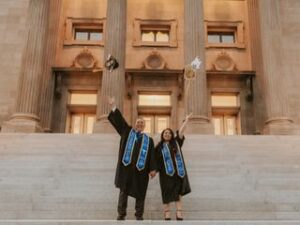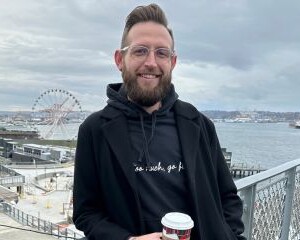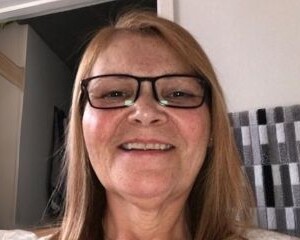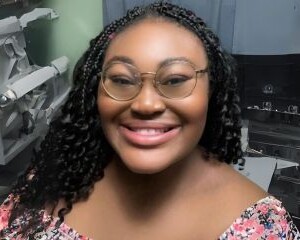Together, First Generation Asian American Couple, Lai and Ryan, Realize Their Dream of Becoming RNs
 Let’s start with each of you telling me a bit about yourself.
Let’s start with each of you telling me a bit about yourself.
Ryan: My parents came to the United States from the Philippines in 1982. I was born in Sacramento and my dad was in the military. When he got out of the military, he still worked for the military. I spent most of my adolescent years in Southern California. I met Lai in an American Sign Language class in Sacramento. At the time, I was working part-time as a City Carrier Assistant for USPS. I wasn’t getting the same salary and benefits as a full-time mail carrier even though I did the same work. I really owe it to Lai for encouraging me to go into nursing. I think I was an LPN for three and a half or four years before we started the Nursing Bridge program. We moved to Boise in May 2020 to go to Carrington and still live across the street from the school.
Lai: I was born and raised in Sacramento. I lived there my whole life until we moved to Boise in 2020 for Carrington. My parents are refugees from Laos and my heritage is Mien. I don’t know if you have heard of that before, but we are of Chinese descent. So, I am a first-generation born here in America–just like Ryan. We are also the first nurses in our families.
Lai, did you encourage Ryan to pursue nursing?
Lai: Yeah, I graduated from LPN school in 2015 and Ryan was a mailman at that time. He saw me and I kept on encouraging him to do it. We both eventually worked as LPNs in California. We worked with a lot of RNs and decided we had to become RNs. We started planning for about three years and worked our butts off to save up money to go to Carrington. We wanted to get out of our hometown because I had never lived outside of it. The cool thing about Carrington is there are so many locations, so we got to choose. We chose Boise because it wasn’t too far from Sacramento, California.
Ryan: We joked about doing this at first in 2018 or 2019 because we didn’t think we would ever be able to move somewhere so far away from our families and be somewhere where we would only have each other. But then we made it happen in May of 2020!
Lai: In the midst of the pandemic no less! In fact, during the first semester, Ryan and I worked in a COVID unit as LPNs because the crisis was so bad in Boise. We felt like we should help out in the community because they were lacking nurses. I would say probably 30% of our patients passed away. It felt like we were going to war against an invisible enemy.
What motivated you to choose Carrington?
Ryan: It was nice the way they put the program together. We checked out other schools and we liked the way Carrington’s program was set up and that we did not have to wait to start the program. That was one of the benefits.
Lai: We checked out other schools and compared. We liked how this program was run and the courses were structured. We also looked into the local community in Boise and really liked the slower pace than California and options for recreation. I think that the lifestyle was fitting for us and it’s something new.
What was your favorite part of your program at Carrington?
Ryan: For me, it was the clinicals. I was in an ICU at one of the local hospitals here in Idaho. It was all new and exciting to me because we did not learn this stuff in LPN school. Whenever we got to work, they would scan us in, ask us questions, and take our temperatures because of the pandemic. The preceptor that I had was really informative and thorough on everything that he did. I was able to hang and push meds and do all kinds of things I never thought I’d be able to do. I was a wound care nurse for a long time. Jumping into the ICU really did help build my confidence.
Lai: My favorite part was creating relationships like the one I have with my preceptor from my clinicals. I still keep in touch with her and I didn’t expect that at all. I have her as a mentor. I created relationships with professors, like Professor Peterson. And then there are the friendships that I created with my classmates. I think that all of these relationships meant more to us than we anticipated because we were all stuck in the pandemic together and doing this learning venture together. The pandemic was extra stress, an extra challenge, and I think that’s what makes these relationships extra special.
What was the most challenging part of your program?
Lai: I want to say, ‘what wasn’t challenging?’ I’m glad it was challenging, though. Going in as an LPN with nursing knowledge already, there is always this skepticism about ‘how are they going to elevate my thinking?’ But then I learned things in nursing that I had never learned before. The big ones were using evidence-based information and learning how to research. I didn’t have those things from being an LPN. What was most challenging was probably learning time management and my study style. Ryan and I have different study styles. Sometimes we would clash! It took us until the second semester to really get a group going where we would share notes. He would be more of a visual and audio person whereas I need to write with pen and pencil. I suppose that was the most challenging part–working for five years and then going back to school and having to relearn how to study.
Ryan: The biggest thing for me was time management. That had to be the hardest thing for me to keep up with. You have all of these assignments that are due and exams in the background that you should be studying for daily. Then I had to work and keep up with chores. Bills don’t stop. That is part of the reason why I was a visual and auditory learner. Whenever I would read, I would never waste time, I would hit the record button on my phone and record myself reading. Then I would listen to it when I was driving. Eventually, I started memorizing the recordings. That helped me out a lot during school.
Did you ever want to quit when you were in school?
Ryan: There are times when you want to cry and probably times when you do cry. You feel like you want to quit, but you’re not going to. We have already come this far. We have to finish.
Lai: There were times when I felt like, ‘oh man, I can’t do this anymore.’ Those feelings never were more powerful than the thought of, ‘I have to do this,’ though. We came so far. We worked so hard to get there. It was my long-term dream to become an RN. So, there was no question we would finish the program with the best grades possible.
What got you through the challenging times?
Ryan: Each other. Now, don’t get me wrong, it wasn’t all flowery with us being in school together. Sometimes we would argue about what medication to give for a certain disease or what to look for in an emergency situation. We would go back and forth for a good minute. Then there are going to be times in school when you don’t get the grade that you want and you see your significant other do well. Then it’s good to bounce off their good energy. You can end up in a rut by yourself, but that never happened because I always had her by me. She could always help me and say, ‘hey, don’t worry, this is just the first test’ or something like that. She would definitely help me get my confidence back.
Lai: I would definitely say it was the support of each other. We worked off of each other’s weaknesses and strengths. Where he was weak and where I was weak, we would try to help each other out and provide support. When we would tell people we were in the nursing program together, they would say you are going to go crazy! You’re going to kill each other! That really wasn’t the case at all.
Are there any Carrington instructors or staff members who you would like to acknowledge?
Lai: The impact Professor Daniel Miller had on me and Ryan was profound. Because he was somewhat strict, he disciplined us and prepared us for the rest of our program. Professor Peterson, of course, and Professor Quiroz! The highlight of Professor Quiroz’s class involved doing a clinical with Peruvian sheepherders in the mountains around Boise. We had a chance to see how they lived and assess their situation and their health. It was a different level of clinical. I don’t think there is any other private college that does that.
Ryan: Professor King was empathetic and helped us relieve anxiety before exams. Our exams are on our computers and my laptop is from 2011, so it’s not very fast. I’d be waiting for the test to load and she would remind me to breathe. Then Professor Daniel Miller. He taught very skillfully. I actually loved the way he structured his class.
Please tell us about your current work.
Lai: Right now I work with one of the biggest hospital systems in Boise–St Alphonsus. I work in the rehabilitation unit. The most rewarding thing for me is I have a part in their recovery process. A lot of my patients right now are stroke patients and post-COVID patients who didn’t think they were going to make it. They were intubated and now they are in my unit and we are helping them heal. Seeing them learn how to walk again is very rewarding, especially for my first RN job.
Ryan: I am still in the same department doing wound care, which is pretty cool. I am very happy to be an RN because now I can get the certification that I want. I work at Cascadia Healthcare, which is a skilled nursing facility. The cool thing about skilled nursing facilities, at least in my experience, is they are more focused on healing the wound than hospitals or even wound care clinics. I have seen pressure injuries to the bone, the muscle, and the fatty tissue. We are literally the last resort as to whether the patient is going to heal it or not. I am blessed to have an awesome wound care provider with who I work. He provides me with a lot more autonomy than others had in the past.
What do you enjoy most about your work?
Lai: Seeing the patients be able to go home. The happiness that I feel for them and see in them makes me happy too. Not just that, I enjoy learning their stories. I gain strength from their stories.
Ryan: The coolest thing about this wound care position is this particular provider. I guess you could also say proving surgeons and other wound care providers wrong. Usually, when we get a new patient, they have a significant wound and other providers might have said that a wound won’t ever heal without surgery. But we have gotten wounds to heal that didn’t need any kind of surgery. That has happened multiple times with us as a team.
How did Carrington prepare you for your career?
Lai: Greatly. They not only prepared me with academics, but they prepared me with how to communicate with my colleagues, other nurses, and doctors. I’m horrible at public speaking and doing school online was way more intimate than I expected. It challenged me and that made me more confident. It made me want to better myself as far as how I present myself and how I talk because I’m shy and my voice shakes a lot when I talk. I’d say that’s how they prepared me. They challenged me to come out of my shell and put my voice out there more in ways that I didn’t expect.
Ryan: Mine was time management and learning how to do something once so it could help you out in the long run. For example, recording myself and then driving and listening to it because I really needed to speed things up with my learning process. Another thing was I talked to Professor Peterson about putting me in an ICU because I really want to go to an ICU eventually and she placed me there so I could see what it was like and know what to expect as a new RN.
Do you have any advice for people going into nursing?
Lai: Go for it. It is all worth it. It is tough. It is hard. It is challenging. Every experience in nursing school is going to have its ups and downs. We were determined to make our experience good–no matter the pandemic.
Ryan: I’d also say ‘go for it.’ You can’t level up without challenging yourself. We need more nurses who have passion. It is very smart to choose nursing. I was kicked out of high school, had a lot of different jobs, and was always on a search for who I was. Finally, at thirty, I figured out that I wanted to do nursing. If I can do it, I am sure other people can! If you keep pushing forward, your reality will change.


